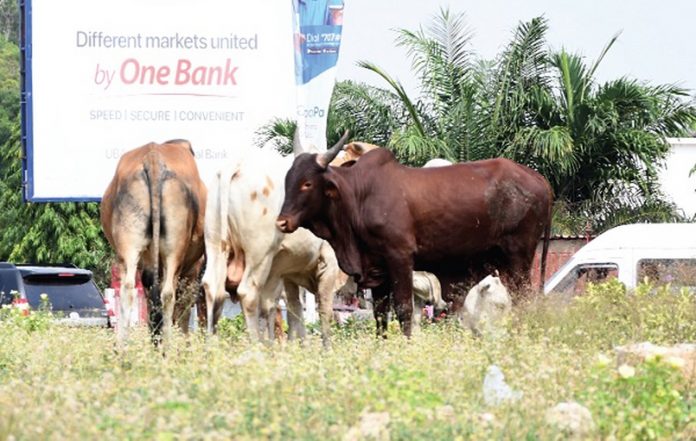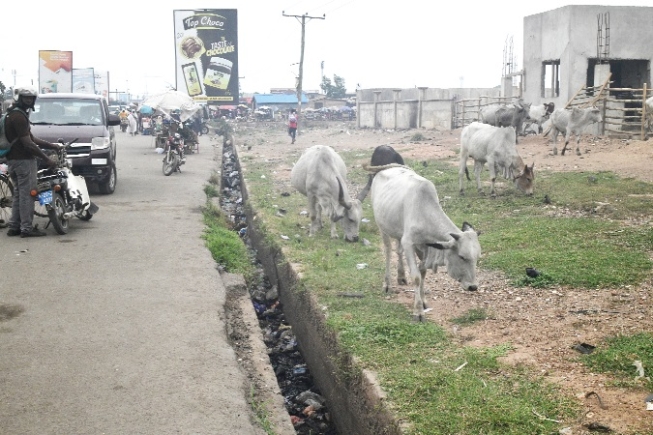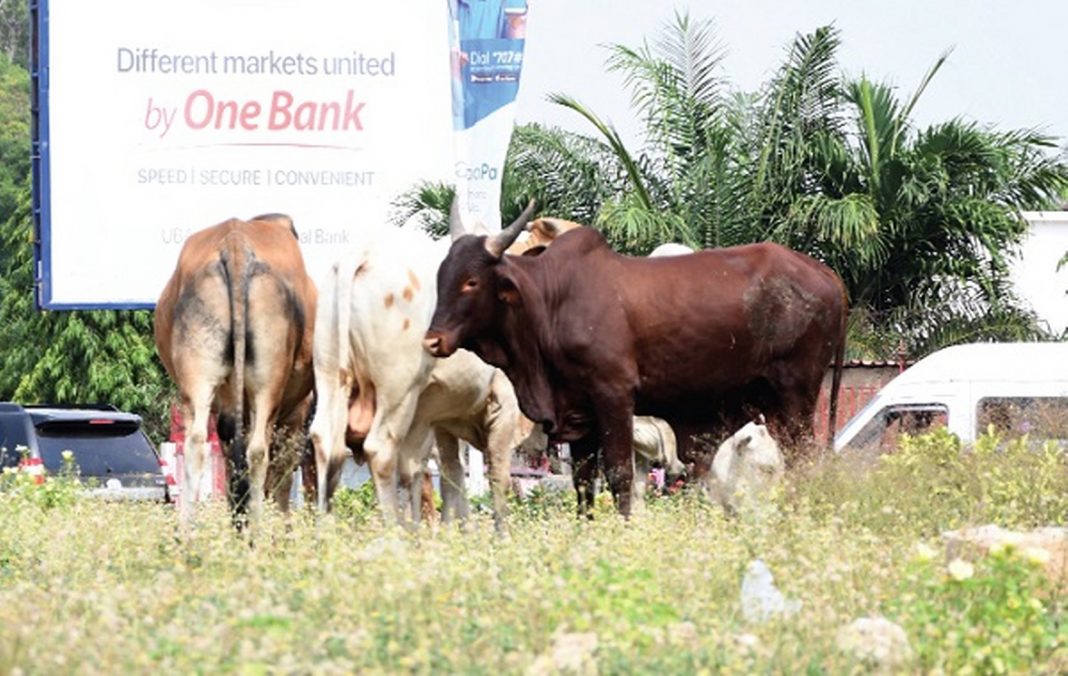
As livestock and other stray animals roam the environment with careless abandon, health officials have raised alarm about the dangers to public health, lamenting that Accra in particular is becoming an open zoo.
With dogs seeking human flesh for meat, rabies and associated deaths are increasing, leaving officials scrambling for solutions.
The Veterinary Services Directorate of the Ministry of Food and Agriculture has consequently called for strict enforcement of bye-laws to purge the country’s streets of stray animals.
The directorate said the situation had become a nuisance to the public and also posed a risk to public health.
Speaking to journalists at the closing ceremony of the Breakthrough Action Ghana project in Accra, the Deputy Director of the Veterinary Services Directorate, Dr Benita Anderson, said “Accra is gradually becoming an open zoo where stray animals on the streets
have become common”.
She said people must be responsible animal owners by ensuring that they keep them from roaming in public.
Dr Anderson added that, the local assemblies had bye-laws that prevented animals from roaming freely, but the laws only remained on the books.
“The bye-laws are not being enforced, and now you see animals all over, which should not be the case. Crossing the roads, you see cattle grazing in between the lanes; you see dogs roaming freely,” she said.
Dr Anderson also raised concerns about the high rate of dog bites in the country in recent times as a result of this phenomenon, and called for measures to curb it.
“There have been a number of reported cases of rabies in animals and humans in recent times, with some deaths being recorded,” she said.
Although mammals such as dogs, cats, and cattle were reservoirs of the rabies virus, the majority of the cases recorded in the country were as a result of dog bites, which Dr Anderson emphasised were “really on the rise”, mentioning an outbreak of rabies in the Bosomtwe area in the Ashanti Region where some people died.
“Recently, less than two weeks ago, in the Sege area in Ada East, a dog bit four people, including an eight-year-old girl and a 73-year-old blind man. Unfortunately, the girl died. So, dog bite cases should be taken seriously,” she said.
“This is a case we heard about. In some cases, we do not hear about them,” she added.
Dog bite data
Meanwhile, data undergoing validation from the District Health Information Management Systems revealed that the country recorded 97,366 dog bite cases between 2017 and 2022.
The data indicated that a minimum of 1,000 cases of dog bites were recorded per month, with May 2022 recording the highest number of 1,533 cases.
“Once you have decided to keep a pet, in this case, a dog, keep them in the home in chains, not the streets, and also attend to their health needs, including vaccination,” she said.
Dr Anderson said rabies vaccination was available for a fee, although free vaccines were provided during World Rabies Day or awareness campaign periods.
She urged the public to take advantage of such events to have their animals vaccinated.

Cattle grazing on the grass near the Abossey Okai Mosque. Pictures: EMManuel quaye
Why stop stray animals
People needed to keep their animals in confined areas to prevent the spread of diseases from animal to human (zoonotic diseases), the Risk Communications Officer of Veterinary Services, Dr Benjamin Kissi Sasu, stated.
Dr Sasu explained that stray animals that died were buried indiscriminately, which could cause an outbreak of disease if such animals carried a contagious disease.
He said burying an animal that died at home without causing a veterinary doctor to examine the animal to ascertain the cause of death could lead to serious health issues for people if the animal was carrying a disease.
“People do not even know that we have animal surgeons who do postmortems for dead animals. We need to know the importance of keeping these animals away from our streets so they do not bring us huge health challenges,” he said.
Bye-laws enforcement
Due to the dangers these stray animals pose to the public, some of the assemblies have started enforcing their bye-laws to deal with the issue.
Recently, the Tema Metropolitan Assembly embarked on an exercise to arrest all stray animals from
the streets of the Tema enclave to remove the nuisance those animals had become to the public.
On March 11, 2023, the Daily Graphic reported that stray animals were causing road accidents in Tema.
The Public Relations Officer of the Accra Metropolitan Assembly (AMA), Gilbert Nii Ankrah, disclosed that metro public health officials in recent times had been sensitising the public to the dangers of stray animals and the punitive measures stipulated in the assembly’s bye-laws in accordance with Section 181 of the Local Governance Act, 2016 (Act 936).
Per the bye-laws, any animal left unattended to in public within the jurisdiction was to be impounded, and owners had to claim them within four days.
Where the animal remains unclaimed by the expiration of the specified period, the animal shall be sold by public auction by a licensed auctioneer or other person appointed by the assembly for that purpose.
Mr Ankrah advised owners of animals, especially livestock, to exercise due care, stressing that the assembly would be arresting animals and then prosecuting identified owners.
The project
The closing ceremony was to share lessons learned from the four-year journey of the Breakthrough Action Ghana project.
The project, which is part of the flagship social and behaviour change communication project of the United States Agency for International Development (USAID) around the world, started in March 2019 by providing national level capacity-building support for Ghanaian institutions and partners.
The four-year project was to effectively support the Ghana Health Service (GHS) in addressing high-risk behaviours associated with Ghana’s six priority zoonotic diseases for the country, namely anthrax, avian influenza, viral haemorrhagic fevers, rabies, trypanosomiasis and zoonotic tuberculosis.
The Director of Public Health of the GHS, Dr Franklin Asiedu Bekoe, said the project exposed the lack of human resources in animal health care.
“The lesson learnt was how to collaborate with the communities to support the Veterinary Services to do their work. We have very little veterinary surgeons in the country, and so if you want to deal with an issue at the lower level, then you have to rely on the community,” he said.
The partnership, he said, had also helped the GHS to address existing health concerns and also positioned it to respond proactively to emerging threats.
The Chief of Party of Breakthrough Action Ghana, Sylvester Segbaya, indicated that the increasing frequency of outbreaks of emerging infectious diseases demanded that countries became well positioned to rapidly respond, mitigate the spread and avert human and animal deaths.
“The joint efforts of our One Health Partners in responding to the COVID-19 pandemic and other zoonotic disease outbreaks — Mpox, Marburg, Lassa fever, and anthrax — is highly commendable,” he said.
He expressed gratitude to the GHS, the Veterinary Services, the media and all community-level actors for their relentless efforts in addressing the issue of stray animals.
The Director of the Health Population and Nutrition Office of USAID-Ghana, Dr Zohra Balsara, said some of the key lessons learnt from the partnership were the importance of cross-sectoral collaboration for global health security, acting quickly in the face of an emerging outbreak to mobilise strong government and community response, as well as the importance of simple and easy-to-access messages to educate the public.
